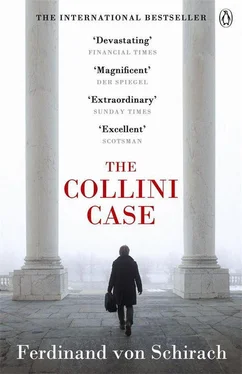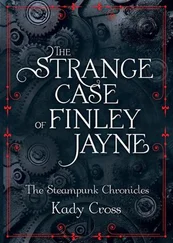On the following morning they went through the attics and the cellars, they searched every folder, they looked in cupboards and chests, but they found nothing to explain what Collini had done. Then Johanna went to his car with him. Before he drove out of the gate to the grounds, he looked back once more. Seen through the melting frost on his rear-view window, Johanna was a blurred shape leaning on one of the white pillars at the entrance, looking up at the bright winter sky.
The 12th Criminal Court – one of the eight courts of first instance in the Berlin regional judiciary where serious felonies were tried – authorized the arraignment of Collini for murder. As usual in major trials, no further evidence was to be heard on that first day, but a psychiatric expert was to attend in order to give an opinion on Collini later. Nor was the list of witnesses particularly long for the next few days: guests at the Hotel Adlon and some of its employees, police officers including those who had interrogated Collini. The forensic pathologist and a ballistics expert were to give their professional opinions, the latter on the murder weapon. The presiding judge thought that she saw the course the trial would take lying clear ahead, and set aside only ten days for the main part of the hearing.
Mattinger appeared on TV news, always saying the same thing: ‘The outcome of the trial will be decided in court.’ He was a wise, friendly presence onscreen, with his white hair, dark three-piece suit and silver tie. And when the cameras had been switched off he explained to the journalists what was at stake. The press printed stories about Mattinger’s trials in the past. One was regarded as legendary: a man’s wife had accused him of raping her. There was all the evidence that might have been expected, haematomas on the inside of her thighs, his sperm in her vagina, consistent statements to the police. The man had two previous convictions for actual bodily harm. The presiding judge questioned the wife; he was thorough about it, he spent two hours going over every detail in her statement. Counsel for the public prosecutor’s office had no questions. But Mattinger didn’t believe the woman. His first question was, ‘Would you care to admit that you’ve been lying?’ She said she would not. He began questioning her at eleven in the morning, and the court adjourned for the day at six in the evening. The presiding judge asked defence counsel to come up to the judges’ bench, and suggested a favourable deal for the defendant: a lenient sentence in return for a confession. Mattinger raised his voice: ‘But don’t you see that the woman is rotten to the core?’ On the next day of the trial Mattinger asked the same opening question. And on the day after that. In the end the wife spent fifty-seven days on the witness stand, obliged to answer his questions. On the morning of the fifty-eighth day she gave way and admitted that, out of jealousy, she had wanted to see her husband behind bars. The last question was the same as the first: ‘Would you care to admit that you’ve been lying?’ This time she nodded. The defendant was acquitted. Either Mattinger couldn’t bear injustice, or there was no way he could lose a case. In any event, he never gave up.
These days the old lawyer sat at his desk every night, seeing the lights from the Kurfürstendamm. But now, the night before the first day of the main trial, he felt old. He didn’t want to go to bed. His wife had been dead for fifteen years, but all the same he still reached out for her every morning, half asleep, and he almost always woke with a start because she wasn’t there. When she died he had sat beside her on the bed. First it was abdominal cancer, then the tumours spread; in the end the doctors said there was no hope left. She hadn’t smelled like herself for weeks, too many medicinal drugs, too much morphine. He had sat beside the bed holding her hand, even on that last day when the ECG showed only a flat line. The doctors said she hadn’t felt anything. It had been a relief to him when she died, and he was ashamed of that later. He had risen and opened the window. Down in the street outside the hospital, other people were taking their shopping home, walking arm in arm, phoning, quarrelling, talking, laughing. Mattinger had thought he no longer belonged to that world.
Now he lit a cigar and bent over the files again. When he switched off the light at two in the morning, he knew them almost by heart.
Caspar Leinen was also awake that night. He stayed in his chambers until three-thirty in the morning. There were piles of paper all over his desk; he had sorted the files into witness statements, the opinions of experts, police reports, forensic evidence. Leinen was looking for something, although he didn’t know what. He had overlooked some small detail. There must be a key somewhere that would explain the murder and put the world back in order. He smoked too much, he felt nervous, and he was afraid. Hans Meyer’s chessboard stood on the side table beside his desk, with the old chessmen divided between the stacks of paper, acting as paperweights. Leinen thought of Johanna; four black-and-white pictures from a photo booth were fixed to the shade of his table lamp with sticky tape. She would be in court tomorrow; she wanted to see her grandfather’s killer. He looked at the pictures and realized how tired he was. Leinen found his briefcase, but he put only the document with the arraignment into it; he wouldn’t need anything else tomorrow. Then he put the white king from the chess set in his trouser pocket, got into his coat, put his robe over his arm and left his office.
The night sky was cloudless; it was cold. He thought about the fact that tomorrow three legally qualified judges and two lay judges, a public prosecutor, an accessory prosecutor and he himself would be sitting in court to try a man. Eight people leading eight different lives, all with their own wishes, fears and prejudices. They would follow the code of criminal procedure, an old law that determines the course of a trial. Hundreds of books had been written about it; verdicts were quashed if a court failed to observe a single one of its clauses, four hundred of them or more in all. Leinen walked past Mattinger’s chambers and looked up at the windows. The old lawyer had said that every trial should be a battle for what was right; that was how the fathers of the laws had intended it. The rules were clear and strict, and only if they were kept could justice be done.
The tarts on the Kurfürstendamm stood in front of the illuminated ads. One of them accosted Leinen; he politely declined her offer and went home through the nocturnal streets of Berlin.
The police officers on duty in the courthouse began doing the rounds of its courtrooms; they had to hang a notice announcing the day’s programme there on the door of each one. The notices said who was being tried and when. The officers would need about an hour; the building comprised twelve courtyards, seventeen staircases, and there were about three hundred hearings every day. An officer fixed a single sheet of paper up with a drawing pin beside the tall wooden double doors with the number 500 on them, the doors to the largest courtroom in the building:
‘12th Criminal Court – trial of Fabrizio Collini for murder – 9.00 a.m.’
‘A coffee, please.’ Caspar Leinen hadn’t slept much, but he was full of adrenalin and wide awake. He was sitting in Weilers, a café opposite the courthouse. Everyone came in here for home-made cake and open sandwiches. Some said that Weilers was the real central point of the criminal division of the district court. Defence lawyers sat here every day, along with prosecutors, judges and expert witnesses, discussing trials and doing deals.
Читать дальше












